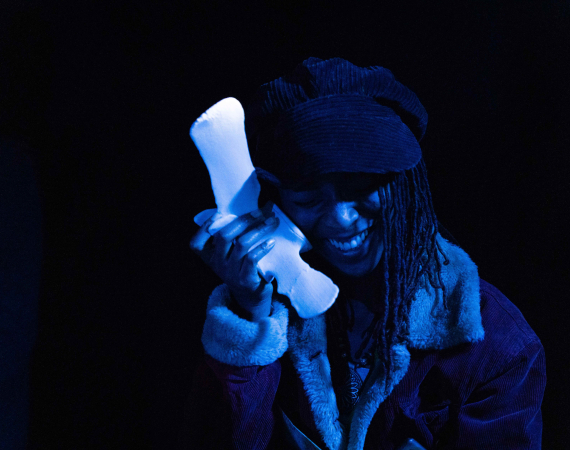Article
Posted on Mon 8 May 2023
Community Conversation: Faith and Technology
A discussion about how what we believe relates to the tools, systems and platforms that we build and use.

Jon Aitken Hopeful Futures 2022
Posted by

Jo Lansdowne
Jo leads Watershed's Creative Technology team; supporting research activity, talent development and the resident community to deliver brilliant work.We know that many people in the Studio community have a faith, or are interested in the role that faith plays in informing how we see the world and therefore the things that we make, consume and connect to. We think the value of our community is that we are made up of very different perspectives, practices and approaches. So last month, we hosted a conversation about how what we believe relates to the tools, systems and platforms that we build and use. We invited those who felt comfortable doing so, to kickstart the discussion by talking for 5 minutes about their experience, knowledge or curiosity on the topic.
Who came
Jo Lansdowne, Martin O’Leary, Furaha Asani, Danielle Rose, Lawottim Anywar, Kat Watts, James Wheale, Kerry Harrison, Sara Zaltash, Zoe Rasbash, Jack Lowe, Bridget Hart, Tony Bhajam.
The discussion was chaired by me, with the aim of encouraging a respectful space in which people felt able to share opinions, ask questions, acknowledge contradictions, disagree with each other and change their minds.
Our conversation was punctuated by short presentations:
Sara Zaltash: Pantheism and Machines of Loving Grace, toward a theology of Gaia’s technological longing to return to Oneness, by way of belief in our instruments of connection.
Kerry Harrison: As more people turn to generative AI tools like ChatGPT and Midjourney, we can use them in a way that sits with Yoga's ethical guidelines?
James Wheale: A personal and professional history of exploring religious and spiritual practices and how they connect to their social, political and technological contexts. And ghosts.
What we talked about:
1. What do the belief structures of our childhoods reveal about us?
As we introduced ourselves, people chose to speak about whether or not their families and schools had been religious, and what that had meant for them. There was something really interesting about this way into a conversation – it created a framework of understanding that was both individual and collective. It wasn't that hearing a bit about people’s religious connection revealed everything about how they navigate the world... but patterns of belief and inquiry were made more visible than is normally the case.
I don’t believe that developing a defining set of values, and questioning the values which we are given is the sole preserve of religion but perhaps if you grow up in a religious environment you are offered a set of language with which to interrogate how to live, and why. For those around the table without that (like me), the invitation was to do the same.
2. Desire paths and morality
We talked about the relative merits of being a person that strays off the official trail in order to find the most direct route to a destination (the resulting tracks are known as desire paths). About whether this represents an admirable independence of character or a selfish disregard for the common good, and about how our contradictory impulses inform the ways that systems are built. Questions about how we make rules to govern behaviour are clearly at the heart of religion, but also technological innovation – both in terms of experience design and in creating ethical frameworks for powerful new tools.
We talked about corruption as being part of the life cycle of development. Maybe rather than feeling that the options are total trust in powers beyond our control, or absolute resistance to them - we can recognise the potential for corruption and engage with it as a generative force.
3. What if we trusted and cared for our instruments?
Our conversation included many examples of objects and tools – telephones, AI, the internet, cameras – that we have close relationships to. We acknowledged that many of these have been used in connection with spirituality, particularly as a way of trying to communicate with or prove the ongoing presence of people who have died. Whether or not this purpose has been part of the invention process, it has often been one of the first use cases proposed for the machines we hold dear.
We also reflected on belief systems which imbue objects with souls, or something like souls, and how that might shape how we relate to them. Perhaps that is about care and respect for the materials around us, which might encourage us not to merely extract and discard. Or perhaps approaching our technologies with love and curiosity, tending to them as potential collaborators, might enable joy and discovery.
4. Faith is a technology
If technologies are system of materials, processes and practices that we design in response to human need - we might think about religion in the same way. By reflecting on how faith-based buildings, rules and rituals have developed within particular contexts – of conflict, scarcity, industry, social change – we can acknowledge their utility as well as their spirituality.
This recognises the complexity, and perhaps interdependence, of both Faith and Technology. Inspiring, confusing, open to corruption, rich with potential, powered by natural forces, shaped and reconfigured by humans, loved, feared, and found everywhere that people gather.
This was one in a series of Community Conversations that bring people together to talk about the issues they care about.